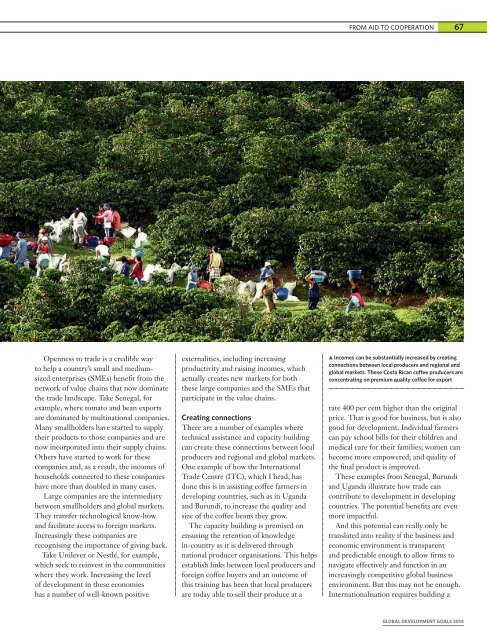FAMBB
FAMBB
FAMBB
You also want an ePaper? Increase the reach of your titles
YUMPU automatically turns print PDFs into web optimized ePapers that Google loves.
FROM AID TO COOPERATION67Openness to trade is a credible wayto help a country’s small and mediumsizedenterprises (SMEs) benefit from thenetwork of value chains that now dominatethe trade landscape. Take Senegal, forexample, where tomato and bean exportsare dominated by multinational companies.Many smallholders have started to supplytheir products to those companies and arenow incorporated into their supply chains.Others have started to work for thesecompanies and, as a result, the incomes ofhouseholds connected to these companieshave more than doubled in many cases.Large companies are the intermediarybetween smallholders and global markets.They transfer technological know-howand facilitate access to foreign markets.Increasingly these companies arerecognising the importance of giving back.Take Unilever or Nestlé, for example,which seek to reinvest in the communitieswhere they work. Increasing the levelof development in these economieshas a number of well-known positiveexternalities, including increasingproductivity and raising incomes, whichactually creates new markets for boththese large companies and the SMEs thatparticipate in the value chains.Creating connectionsThere are a number of examples wheretechnical assistance and capacity buildingcan create these connections between localproducers and regional and global markets.One example of how the InternationalTrade Centre (ITC), which I head, hasdone this is in assisting coffee farmers indeveloping countries, such as in Ugandaand Burundi, to increase the quality andsize of the coffee beans they grow.The capacity building is premised onensuring the retention of knowledgein-country as it is delivered throughnational producer organisations. This helpsestablish links between local producers andforeign coffee buyers and an outcome ofthis training has been that local producersare today able to sell their produce at aIncomes can be substantially increased by creatingconnections between local producers and regional andglobal markets. These Costa Rican coffee producers areconcentrating on premium quality coffee for exportrate 400 per cent higher than the originalprice. That is good for business, but is alsogood for development. Individual farmerscan pay school bills for their children andmedical care for their families; women canbecome more empowered; and quality ofthe final product is improved.These examples from Senegal, Burundiand Uganda illustrate how trade cancontribute to development in developingcountries. The potential benefits are evenmore impactful.And this potential can really only betranslated into reality if the business andeconomic environment is transparentand predictable enough to allow firms tonavigate effectively and function in anincreasingly competitive global businessenvironment. But this may not be enough.Internationalisation requires building aGLOBAL DEVELOPMENT GOALS 2014


